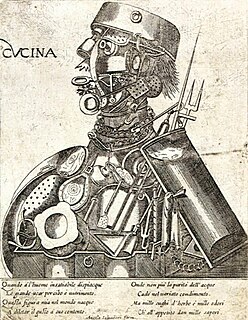
Cyberspace is a concept describing a widespread interconnected digital technology. "The expression dates back from the first decade of the diffusion of the internet. It refers to the online world as a world 'apart', as distinct from everyday reality. In cyberspace people can hide behind fake identities, as in the famous The New Yorker cartoon." The term entered popular culture from science fiction and the arts but is now used by technology strategists, security professionals, government, military and industry leaders and entrepreneurs to describe the domain of the global technology environment, commonly defined as standing for the global network of interdependent information technology infrastructures, telecommunications networks and computer processing systems. Others consider cyberspace to be just a notional environment in which communication over computer networks occurs. The word became popular in the 1990s when the use of the Internet, networking, and digital communication were all growing dramatically; the term cyberspace was able to represent the many new ideas and phenomena that were emerging.
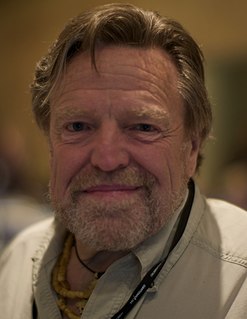
John Perry Barlow was an American poet, essayist, cattle rancher, and cyberlibertarian political activist who had been associated with both the Democratic and Republican parties. He was also a lyricist for the Grateful Dead, a founding member of the Electronic Frontier Foundation and the Freedom of the Press Foundation, and an early fellow at Harvard University's Berkman Klein Center for Internet & Society.

Wired is a monthly American magazine, published in print and online editions, that focuses on how emerging technologies affect culture, the economy, and politics. Owned by Condé Nast, it is headquartered in San Francisco, California, and has been in publication since March/April 1993. Several spin-offs have been launched, including Wired UK, Wired Italia, Wired Japan, and Wired Germany.

Bram Cohen is an American computer programmer, best known as the author of the peer-to-peer (P2P) BitTorrent protocol in 2001, as well as the first file sharing program to use the protocol, also known as BitTorrent. He is also the co-founder of CodeCon and organizer of the San Francisco Bay Area P2P-hackers meeting, was the co-author of Codeville and creator of the Chia cryptocurrency which implements the proof of space-time consensus algorithm.

The Whole Earth 'Lectronic Link, normally shortened to The WELL, was launched in 1985. It is one of the oldest continuously operating virtual communities. By 1993 it had 7,000 members, a staff of 12, and gross annual income of $2 million. A 1997 feature in Wired magazine called it "The world's most influential online community." In 2012, when it was last publicly offered for sale, it had 2,693 members. It is best known for its Internet forums, but also provides email, shell accounts, and web pages. Discussion topics are organized into conferences that cover broad areas of interest. User anonymity is prohibited.
The Berkman Klein Center for Internet & Society is a research center at Harvard University that focuses on the study of cyberspace. Founded at Harvard Law School, the center traditionally focused on internet-related legal issues. On May 15, 2008, the center was elevated to an interfaculty initiative of Harvard University as a whole. It is named after the Berkman family. On July 5, 2016, the center added "Klein" to its name following a gift of $15 million from Michael R. Klein.
Chip Morningstar is an American software architect, mainly for online entertainment and communication.

"A Declaration of the Independence of Cyberspace" is a widely distributed early paper on the applicability of government on the rapidly growing Internet. Commissioned for the pioneering Internet project 24 Hours in Cyberspace, it was written by John Perry Barlow, a founder of the Electronic Frontier Foundation, and published online on February 8, 1996, from Davos, Switzerland. It was written primarily in response to the passing into law of the Telecommunications Act of 1996 in the United States. In 2014, the Department of Records recorded and released audio and video content of Barlow reading the Declaration.

Jeff Moss, also known as Dark Tangent, is an American hacker, computer and internet security expert who founded the Black Hat and DEF CON computer security conferences.
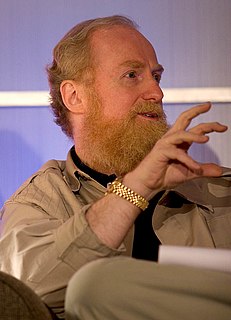
Bran Ferren, is an American technologist, artist, architectural designer, vehicle designer, engineer, lighting and sound designer, visual effects artist, scientist, lecturer, photographer, entrepreneur, and a prolific inventor. Ferren is the former President of Research and Development of Walt Disney Imagineering as well as founder of Associates & Ferren, a multidisciplinary engineering and design firm acquired in 1993 by Disney. He is Chief Creative Officer of Applied Minds, which he co-founded in 2000 with Danny Hillis. Apple's "pinch-to-zoom" patent, which features prominently in its legal battle with Samsung, was invalidated by the US Patent and Trademark Office in 2013 based on a 2005 patent by Ferren and Hillis for multi-touch gestures.
Jeff Ma or Jeffrey Ma is a former member of the MIT Blackjack Team in the mid-1990s. He graduated from Phillips Exeter Academy. He attended MIT where he graduated with a degree in mechanical engineering in 1994. He was the basis for the main character of the book Bringing Down the House and the film 21. Ma also co-founded PROTRADE and does consulting work for professional sports teams including the Portland Trail Blazers and San Francisco 49ers. He cofounded Citizen Sports, a sport-information website and iPhone application based in San Francisco, which was acquired by Yahoo! in May 2010.
The Siebel Scholars program was established by the Thomas and Stacey Siebel Foundation in 2000 to recognize the most talented students at 29 graduate schools of business, computer science, bioengineering, and energy science in the United States, China, France, Italy, and Japan.
The Electronic Frontier Foundation (EFF) is an international non-profit digital rights group based in San Francisco, California. The foundation was formed on 10 July 1990 by John Gilmore, John Perry Barlow and Mitch Kapor to promote Internet civil liberties.

Nation.1 was a project to create what was described as an "online country" – a conceptual country based on the Internet. It was to be owned, populated and governed by the children of the world. Its borders were defined by the age of its citizens, as opposed to geography or ethnicity. The central goal of Nation.1 was to empower young people with a voice and representation in world affairs.

Wired UK is a bimonthly magazine that reports on the effects of science and technology. It covers a broad range of topics including design, architecture, culture, the economy, politics and philosophy. Owned by Condé Nast Publications, it is published in London and is an offshoot of the original American Wired.
Spime is a neologism for a futuristic object, characteristic to the Internet of Things, that can be tracked through space and time throughout its lifetime. They are essentially virtual master objects that can, at various times, have physical incarnations of themselves. An object can be considered a spime when all of its essential information is stored in the cloud. Bruce Sterling sees spimes as coming through the convergence of six emerging technologies, related to both the manufacturing process for consumer goods, and through identification and location technologies. Depending on context, the term "spime" can refer to both—the archetype, as designed by the developer, or a user-specific instance of it.
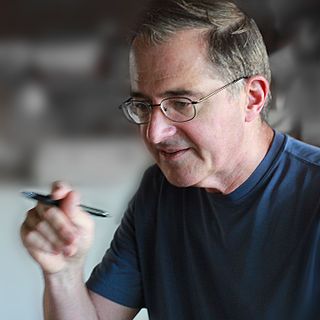
Christian Frederick "Chris" Gulker was an American photographer, programmer, writer, and pioneer in electronic publishing.
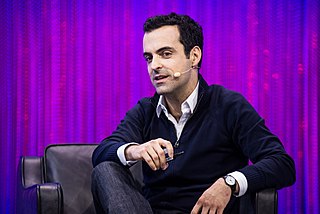
Hugo Barra is a Brazilian computer scientist, technology executive and entrepreneur. From 2008 to 2013, he served in a number of product management roles at Google in London and California, including Vice President and product spokesperson of Google's Android division. From 2013 to 2017, he worked at Xiaomi as Vice President, Global. From 2017 to 2021, he worked as Vice President of Virtual Reality and Head of the Oculus division at Facebook. In May 2021, he left Facebook to start health technology startup Detect.
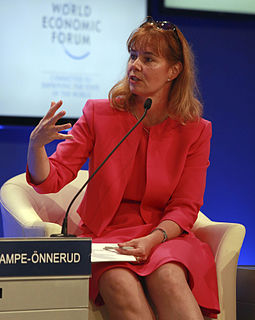
Maria Christina Lampe-Önnerud is a Swedish inorganic chemist, battery-inventor, and entrepreneur. She has founded the companies Boston-Power Inc. (2005–2012) and Cadenza Innovation. She is developing batteries for use in computers, electric vehicles, and grid storage. She has received a number of awards, including the World Economic Forum's Technology Pioneer Award in 2010 and again in 2018, and is an elected member of the Royal Swedish Academy of Engineering Sciences. Lampe-Önnerud has many interests, including opera singing, jazz dancing, playing the cello, and choir directing.
Raymond Stuart Stata is an American entrepreneur, engineer and investor.













